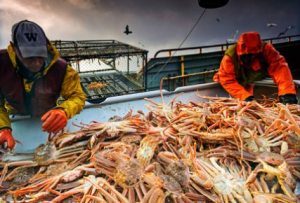206.624.8844
Ways to Improve Commercial Fishing Deck Safety
According to the Ce nter for Disease Control and Prevention (CDC), on-deck injuries account for 12% of all fatalities in the commercial fishing industry and the largest number of hospitalizations in non-fatal injuries. Most of these injuries (67%) occur on deck during the deployment and retrieval of fishing gear. In order to avoid injuries, employers should conduct a job safety analysis of their fishing gear deployment and retrieval process to look for ways to prevent injuries.
nter for Disease Control and Prevention (CDC), on-deck injuries account for 12% of all fatalities in the commercial fishing industry and the largest number of hospitalizations in non-fatal injuries. Most of these injuries (67%) occur on deck during the deployment and retrieval of fishing gear. In order to avoid injuries, employers should conduct a job safety analysis of their fishing gear deployment and retrieval process to look for ways to prevent injuries.
Vessel owners should also carefully evaluate the deck environment for slip and trip hazards as well as other common types of hazards out on deck. Crew fatigue is another common cause of injuries out on deck. The deck of commercial fishing boats are oftentimes congested with machinery and fishing equipment that can lead to severe slips and falls or entanglement. Many employers take inadequate measures to make certain that adequate guarding and safety features common in other industries are used on fishing vessels to prevent injuries out on deck.
Vessel owners should evaluate their vessels for the following safety equipment and measures:
- Closed Circuit TV of deck operations – allows skipper to see the crew working on deck and watch for unsafe conditions;
- Improve Lighting – Vessel owners should eliminate dark spots on the deck of the vessel by adding more lighting. Make certain that the hauling station and the aft deck have adequate lighting.
- Guards on any machines with moving parts;
- Non-skid paint in areas where the crew walks;
- Good housekeeping – keep decks clear of tripping hazards, line, slick bait, or other items that may lead to slips and falls;
- Have a good rotation in place and adequate crew numbers to prevent excessive fatigue that can lead to deadly mistakes;
- Announce large waves on the loud hailer to give the crew adequate time to take cover before waves wash onto the deck;
- Use hard hats when working with suspended loads;
- Limit the time that crew members work in extremely cold conditions out on deck or in the freezer hold;
- Properly stack cargo in the freezer hold so that it cannot collapse on the crew working in the freezer during heavy weather. Stacks of fish product should never be stacked higher than waist-level and the crew should be properly trained on how to interlock the product.
Having represented many injured commercial fishermen over the years, we have seen through experience many unsafe conditions out on deck lead to devastating life-long injuries and even deaths. The root cause of most of these injuries is the vessel owner’s failure to follow well-known safety measures that prevent injuries.
 Seattle Maritime Injury Lawyer Blog
Seattle Maritime Injury Lawyer Blog

